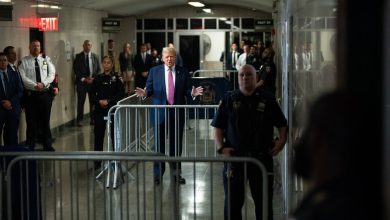Elon Musk Fuels Record C.E.O. Paydays


Raising the pay roof.Credit…Aly Song/Reuters
Musk sends executive pay into orbit
In 2018, Elon Musk unveiled a groundbreaking compensation plan that was composed entirely of an enormous stock grant tied to Tesla’s performance. The plan linked his compensation to the future value of Tesla and the electric vehicle company’s ability to hit hugely ambitious targets for sales and operating profit. The gamble seems to have paid off: Musk has so far received shares for the award worth just over $60 billion. But it’s not only Musk that has profited: Compensation experts say they see the influence of Mr. Musk’s deal everywhere.
Executives are earning record-breaking compensation figures, Peter Eavis of The Times writes. All of the 10 highest-paid executives in 2021 had compensation over $100 million, a first, according to a survey of 200 large companies by compensation consulting firm Equilar. Their average compensation was $330 million, the highest ever. The median chief executive made $32.1 million in 2021, up 27 percent from $25.3 million in 2020 and far higher than in prepandemic years.
Some of the top earners:
-
Jeff Green, the C.E.O. of The Trade Desk, a digital advertising company, who reported compensation of $835 million last year, making him the top-paid executive in the survey.
-
Zig Serafin, the C.E.O. of Qualtrics, was second last year with compensation of $541 million. It was the fourth-highest sum of the past five years.
-
Peter Kern, the C.E.O. of Expedia, was third, with pay worth $296 million.
-
Sue Nabi, the C.E.O. of Coty, was the only woman in the 20 top-paid executives. She ranked fifth with $284 million in compensation.
Many of the top earners received pay packages far larger than C.E.O.s of bigger and more profitable companies. Tim Cook, C.E.O. of Apple, received his first equity award since 2011 last year and had total compensation of $99 million, putting him just 13th in the survey. What’s more, in certain respects, last year’s biggest pay deals were not as demanding as Mr. Musk’s: Trade Desk’s Green, for example, had no business goals to meet.
A bear market could change things. The compensation totals are taken from the company’s financial filings, but they are often only estimates that could change alongside stock variations. The recent plunge in Tesla’s share price means the stock that Musk has received from the 2018 award is worth significantly less than it was just months ago (and potentially helps explain his apparent jitters in buying Twitter).
HERE’S WHAT’S HAPPENING
Russia misses debt deadline. The grace period for a $100 million interest payment expired on Sunday night, appearing to push the country into its first foreign debt default since the Bolshevik Revolution. Russia’s state news agency reported that the government did not consider itself to be in default, as it has made efforts to pay despite Western sanctions.
China’s industrial profits slump for a second month. The National Bureau of Statistics reports that corporate profits were down more than 6 percent last month compared with May of last year, following an 8.5 percent decline in April. While strict Covid restrictions are being loosened in major cities, economic anxiety and diminished production are clouding prospects for a quick economic recovery.
Ghislaine Maxwell sentencing faces potential delays. The disgraced financier Jeffrey Epstein’s former companion, who was convicted of sex trafficking and conspiracy charges last year and is set to return to court on Tuesday, is on suicide watch. Her lawyer says that she is not suicidal, however, and may seek an extension because the move makes hearing prep difficult.
Frontier gets a boost in battle for Spirit. The influential shareholder advisory service Institutional Shareholder Services is reversing an earlier statement, saying Spirit Airlines’ investors should vote for a proposed merger with Frontier Airlines over a rival offer from JetBlue Airways. The reversal comes after Frontier increased its offer ahead of a shareholder meeting this week, and as global M&A hits a dry spell.
Subpoenas are stacking up for the SPAC that plans to buy former President Donald Trump’s media company. A new filing to the S.E.C. says every board director for Digital World Acquisition Corp. has been issued a subpoena by a federal grand jury in the Southern District of New York. The disclosure by Digital World is the first indication that federal prosecutors in Manhattan have joined in the scrutiny of the merger between Digital World and Trump Media, which has been under investigation by financial regulators for months.
Majority Black-owned venture capital firm raising new fund
MaC Venture Capital, one of the few majority Black-owned V.C. firms, has raised $203 million for its second fund, DealBook has learned. The firm’s founders include Adrian Fenty, the former mayor of Washington, D.C. The firm is smaller than Vista Equity Partners, which manages over $90 billion and was founded by Robert Smith, the prominent Black investor and philanthropist.
MaC, which now manages over $400 million, is among the largest majority Black-owned V.C. firms, along with Harlem Capital, with a mandate to invest in diverse funds. “I’m not convinced that the market yet sees diversity as an economic strength,” Marlon Nichols, one of the firm’s founders, who was previously at Intel, told DealBook. “It sees it more as this is something that is good to do.”
Like most V.C. funds, MaC has ventured into riskier tech markets, and some hot start-ups that it has invested in have struggled. MaC was an early investor in FaZe Clan, an e-sports company that, as DealBook reported, announced plans to go public through a merger with a SPAC in October. That deal now looks to move forward, but it was delayed after FaZe announced disappointing financial results. MaC has also invested in Artie, a gaming platform company that is backed by the N.B.A. star Kevin Durant and has expanded into the NFT market.
But as venture capital deals slow overall, investment in Black-founded firms has dropped by more than half. After a summer of racial reckoning in 2020, many banks and venture firms pledged to support Black businesses and committed to investing in diverse funds. Investment in Black-founded start-ups rose to $1.2 billion in the first quarter of 2021, according to Crunchbase. V.C. firms have invested just $324 million in Black-founded firms in the second quarter of 2022, down nearly 75 percent from the 2021 quarterly high. “I think where we sit today, it’s kind of business as usual,” Nichols said.
“I would tell every single business and every single woman that they should do what is best for the women that work for them. They need to make certain they are accommodating the very real health challenges women will face.”
— The Georgia Democratic politician Stacey Abrams, speaking on CNN about the state’s anti-abortion policies and how businesses should respond to Friday’s Supreme Court ruling.
How Elon Musk’s Twitter Deal Unfolded
A blockbuster deal. Elon Musk, the world’s wealthiest man, capped what seemed an improbable attempt by the famously mercurial billionaire to buy Twitter for roughly $44 billion. Here’s how the deal unfolded:
The initial offer. Mr. Musk made an unsolicited bid worth more than $40 billion for the influential social network, saying that he wanted to make Twitter a private company and that he wanted people to be able to speak more freely on the service.
The response. Twitter’s board countered Mr. Musk’s offer with a defense mechanism known as a “poison pill.” This well-worn corporate tactic makes a company less palatable to a potential acquirer by making it more expensive for them to buy shares above a certain threshold.
Securing financing. Though his original offer had scant details and was received skeptically by Wall Street, Mr. Musk has been moving swiftly to secure commitments worth $46.5 billion to finance his bid, putting pressure on Twitter’s board to take his advances seriously.
Striking a deal. With the financing in place, Twitter’s board met with Mr. Musk to discuss his offer. The two sides soon reached a deal, with the social media company agreeing to sell itself for $54.20 a share.
Will the deal go through? For the purchase to be completed, shareholders have to vote first. Questions remain about Mr. Musk’s plans for the company, especially after he threatened to pull out of the deal if Twitter did not provide more information on how it calculates the number of fake accounts. On June 8, the company announced it planned to give him access to a large swath of its data.
Disney’s head streamer
One of Disney’s most powerful executives is a former electrical engineer whose first job at the company was as an intern in the DVD department. Kareem Daniel is now in charge of ensuring that Disney’s streaming services are brimming with enough content to make its rivals nervous, reports The Times’s Brooks Barnes.
Daniel is the first Black executive in Disney’s 99-year history to run a major division. Daniel, while completing an M.B.A. at Stanford, got his intern gig after an interview with Bob Chapek, now Disney’s C.E.O. but a low-level executive at the time. Daniel spent three years as a media-focused associate at Goldman Sachs, before returning to Disney in 2007. Growth at Disney’s streaming service Disney+, which has 138 million subscribers, has exceeded expectations under Daniel.
But pressure is ramping up on Daniel to continue to meet Disney’s lofty streaming goals at a time when rivals, including Netflix, the category leader, are struggling to continue to grow. As chairman of the Disney Media and Entertainment Distribution division,Daniel is, in effect, Disney’s top content traffic cop, making decisions on whether $33 billion in annual film and television content gets routed to streaming, traditional TV channels or theaters. Disney wants to nearly double the number of Disney+ subscribers worldwide by 2024 and ensure the service is profitable by the end of that year, too. And if taking on Netflix wasn’t enough of a challenge for the confessed workaholic, Daniel also has partial oversight of Disney’s effort to build its version of the metaverse.
Some Hollywood creatives are skeptical that Daniel is up to the task. Daniel is fairly unknown in entertainment circles, and has no experience creating content. Many in Hollywood view Daniel’s rise as another sign that content creators are being overtaken by bean counters, and part of a larger reorganization of power under Chapek, who got the top job at Disney in early 2020.
Daniel’s plan is to focus on budgeting, while leaving content decisions to creatives. But it is a heavy top-down approach. Daniel’s team is data-driven, setting the budget for different divisions based on what type of content their research says can drive subscriber or ticket sales growth.
The movie-obsessed executive, who is known to quote lines from “The Breakfast Club” and other classics, is winning fans. Maha Dakhil, a Creative Artists agent who supports clients like Tom Cruise and Natalie Portman, told The Times: “He’s curious and listens. And most of all, I am convinced that he really does love movies.”
THE SPEED READ
Deals
-
Backstage Capital, a venture fund backing underrepresented founders, is downsizing. (TechCrunch)
-
Morgan Creek Digital, an investor in BlockFi, is trying to counter a bailout proposal of the troubled crypto lender from FTX that would wipe out existing shareholders. (CoinDesk)
-
A British electric vehicle charging start-up that ditched a New York-based SPAC deal earlier this year is reportedly close to raising funds from a private investor. (FT)
Abortion ruling
-
The Times is keeping track of the companies that are offering to help their employees gain access to abortion services. (NYT)
-
Some Democratic governors are already playing up their states’ abortion-rights credentials to lure companies to move there. (MarketWatch)
-
Telemedicine consultations to supply abortion pills are likely to become the center of new legal battles. (NYT)
-
Tech companies mum on whether they’ll report abortion related data to law enforcement. (Vice)
Policy
-
Airlines blaming the F.A.A. for flight delays have asked the agency for its staffing plans ahead of the July 4 weekend. (AP)
-
The U.S. is paying 30 percent more to borrow over last year amid interest rate hikes and inflation. (WSJ)
-
Food export bans around the world are causing a spike in commodities prices. (Reuters)
-
Consumers may blame corporate greed for inflation, but economists disagree. (AP)
Best of the rest
-
How cheap foam earplugs could soon become a major liability for 3M. (WSJ)
-
Robinhood employees scrambled to keep the firm afloat during the meme stock frenzy. (WSJ)
-
Leonardo Del Vecchio, the Italian billionaire who owned Ray-Ban and other eyewear brands, has died at 87. (Bloomberg)
-
When after-work drinks go very wrong: a Japanese worker lost a USB flash drive containing the personal details of an entire city’s residents. (CNN)
We’d like your feedback! Please email thoughts and suggestions to [email protected].



